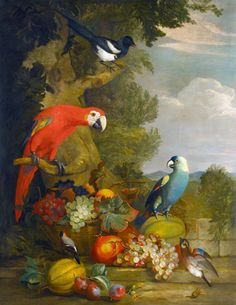THE LONG STREET
The astonished eyes of my grandmother, a girl who had never left the beaches between the hills where she was born, gazed at the houses on the edge of the high carriageways. Two-storey bahareque constructions, whitewashed, with carved wooden portals and a multitude of windows decorated with wrought iron and wood. Houses with Spanish mosaic floors and wide and open hallways, where the paisanos (which was what the Arabs were called here for the epoch, they were also called Turks for having a Turkish passport) exhibited their goods brought from many ports: pieces of fine cloth, painted earthenware from the Orient, bottles of French perfume, hawksbill combs, Spanish mantles; but also bread and fruit and casabe and papelón and corn and sweet mapuey. And beautiful, blissful women, with huge eyes and luxurious clothes, and bearded men with sharp eyes.
And macaws.
Macaws in cages and playpens. Blue and red macaws. Screaming and strident.
Macaws in small miniature houses that accompanied the families of paisanos seated in armchairs and rocking chairs in the doors of their houses, eating sideburns, drinking tea. Smoking their narguiles. Chatting in joyful chorus with the birds.
In fact, it was the longest street in the city and it had established the bulk of merchants of Lebanese origin who came to try their luck here in this small coastal city where I live, Cumaná, La Primogénita. My grandmother told me that they called it the Athens of the East, because of the number of poets and musicians who inhabited it.
The Calle Larga began at that time where Puerto Sucre ended and extended to where today is the Puente Guzmán Blanco, in the center of the city, near a huge tamarind and already exhausted in his old age of more than four hundred years; In the middle of the street was La Coquera, the coconut oil factory and, further down, following the course of the Manzanares river that divides the city ("A river of ink", as the poet José Antonio Ramos Sucre called it), there was the Santa Inés church and the Nueva Andalucía soap factory.
The Long Street, the Calle Larga, today called Avenida Bermúdez, was a passage to the prodigies in my grandmother's marvelled eyes. A street that remained forever populated with macaws in her memory.
Many years later, when senility made her lose my name in a confused labyrinth of people she had loved and hated, buried and seen born, the Calle Larga continued to persist in the chain of her stories. Forever, Long Street was inhabited by macaws, only now they were regal women, adorned with all kinds of jewelry and feathers.
"The Turks made their dresses with feathers," she told me. "You must remember, they wore crowns of pearls and skirts of feathers and gold chains." And, from the temporary impossibility that her arguments were, I told her that yes, that I remembered, while she tried to find in vain the lost end of the skein of her stories.
And I remember it. How can I say that these are not my memories?
The Calle Larga, today Avenida Bermúdez in the center of my city, was so called because it was long, very long, and was invaded by the amazing visions of a little girl who many years ago, from the last century until today, still sees macaws from my dreams.

Gracias por la compañía. Bienvenidos siempre.
Soy miembro de @EquipoCardumen.
Soy miembro de @TalentClub.
Posted from my blog with SteemPress : https://becksbitcoin.com/2019/08/28/the-long-street-an-essay-end/

Congratulations @adncabrera! You have completed the following achievement on the Steem blockchain and have been rewarded with new badge(s) :
You can view your badges on your Steem Board and compare to others on the Steem Ranking
If you no longer want to receive notifications, reply to this comment with the word
STOPTo support your work, I also upvoted your post!
Vote for @Steemitboard as a witness to get one more award and increased upvotes!